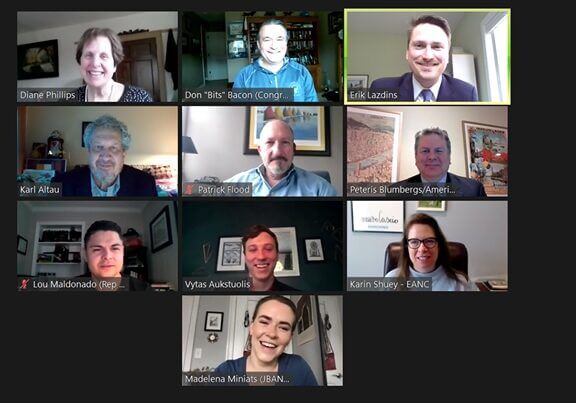The Joint Baltic American National Committee (JBANC) held its first virtual Baltic Advocacy Week from March 8th to 12th. JBANC has been holding annual in-person advocacy events for several years but missed last year because of the coronavirus. Adapting the event to the circumstances of the pandemic turned out to be a successful endeavor. The Estonian American National Council (EANC) was fully integrated into the planning team and played a key role in the event’s execution.

Over sixty Baltic Americans from sixteen states signed up to take part in constituent meetings with their Members of Congress (MoC). At least fifteen meetings were held via video conference or conference call with staffers that handle foreign affairs or legislative issues for their MoC. For at least three meetings, the actual Senator or Representative joined the call. The meetings proved to be welcomed by all parties and effective in sharing the message that U.S. investment in Baltic security and support to the broader region are vital to ensuring transatlantic security.
The MoCs who tuned in were all co-chairs of their chamber’s Baltic caucus. Senators Chuck Grassley (R-IA) and Dick Durbin (D-IL) co-chair the Senate Baltic Freedom Caucus, and Representative Don Bacon (R-NE) recently took over as Republican co-chair of the House Baltic Caucus after Representative John Shimkus retired at the end of the 116th Congress. All three were very supportive of the issues and legislation that were discussed. As a retired U.S. Air Force General, Representative Bacon has extensive experience in the European theater and a clear understanding of the threats Estonia, Latvia, and Lithuania face, and will be a valuable ally in Congress.
The meetings focused on three main topic areas. Continued U.S. funding to the Baltic defense forces was the top priority. Participants asked Congress to support the Baltic Security Initiative, which was introduced in the fiscal year 2021 budget to provide funding for ongoing development of Baltic air defense and interoperability with NATO and other partners. $169 million was allocated in FY 2021 and the same amount or higher for FY 2022 was requested in the meetings. Foreign Military Financing is an established program that provides grants and loans to help the nations purchase defense equipment produced in the U.S. The Baltic countries received $30 million in FY 2021 and similar funding levels were requested for FY 2022.
The next topic dealt with energy security and regional development. Sanctions to halt construction of the Nord Stream 2 pipeline that will carry natural gas from Russia to Germany is the most urgent issue in this area. The pipeline is 90% complete and is estimated to be finished sometime this summer unless measures are taken to persuade the companies involved to stop work. If the pipeline is finished, the Kremlin will have a powerful tool of political influence over Germany and other European nations that will depend on it for fuel. Event participants asked their MoCs to enforce the bipartisan sanctions legislation that was passed last year to stop the pipeline. Participants also called for U.S. participation in the Three Seas Initiative collaboration among 12 European Union nations located between the Baltic, Black, and Adriatic Seas to develop infrastructure projects for energy, transportation and digital interconnectivity.
The final topic area shined a light on corruption, human rights violations, and nations struggling to establish democracy. The Global Magnitsky Human Rights Accountability Act to counter Kremlin corruption has led to sanctions against almost 250 individuals in 33 countries since it was passed in 2016. Since it is due to expire in 2022, event participants advocated for the Senate bill that would reauthorize and strengthen the original bill’s sanctions and repeal its sunset clause. The Crimea Annexation Non-Recognition Act was also on the list of priority legislation, especially with its ties to the Welles Declaration of 1940 that established the U.S. policy of non-recognition of the Soviet annexation of the Baltic states. EANC thanks all of the participants and Congressional offices that supported this Baltic Advocacy Week. JBANC intends to continue holding the events annually, whether in-person, virtually, or in some combination of both. We look forward to helping our constituents take part in future events, and to supporting anyone interested in contacting Congress in the meantime on these and other important issues relevant to Baltic security. Please email our Washington, DC Director, Karin Shuey at [email protected] if you’d like to get involved.
Karin Shuey
Washington, DC Director
Estonian American National Council
www.estosite.org
















